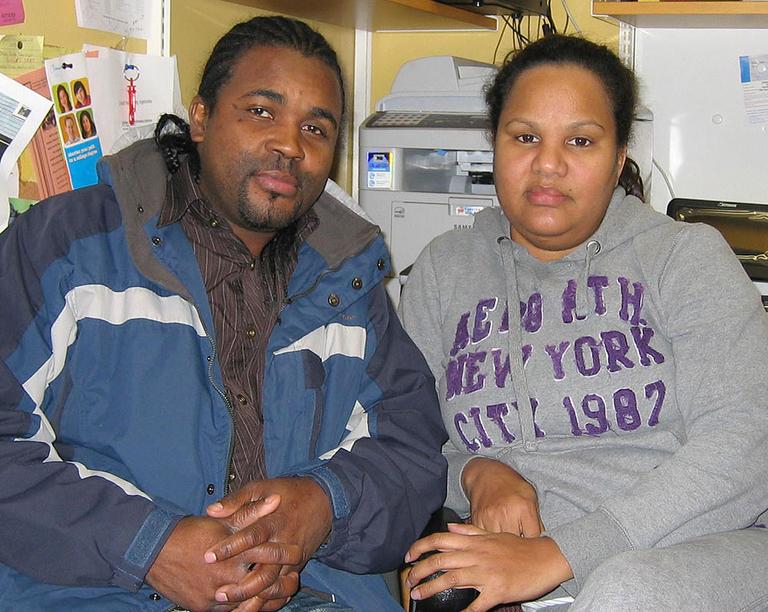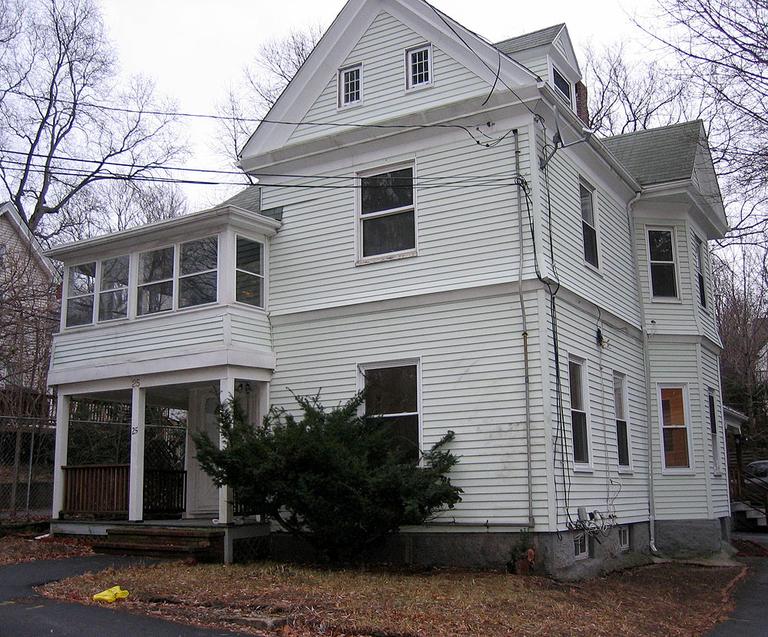Advertisement
A Family Loses A Dream While Investors Cash In
ResumeAlthough the number of foreclosures in Massachusetts is expected to drop next year, for now, the number continues to rise. This year, lenders in the state have filed more than 22,000 petitions to take homes, and more than 11,000 properties have already been seized — including the former home of Pierre Solon and Katty Famila. Their case illustrates a crisis that continues to hit low-income families the hardest.

In one sense, this story has played out millions of times across the United States. However, what is striking about this case is what happened to the house after the family lost it.
Losing A Dream
Solon and Familia own the Little Wonders Daycare Center in Boston. On a recent afternoon, about a dozen kids were sleeping on cots underneath brightly colored blankets. Solon, who comes from Haiti, and Familia, who comes from the Dominican Republic, have been running their business for the past two years while fighting to get their home back.
In 2006, Solon and Familia bought a green clapboard house in Boston’s Hyde Park neighborhood. Familia, a small woman whose eyes flash with determination, says they both took on extra work to pay for it.
“We made a lot of sacrifices," she says. “Sometimes we (didn’t) even have food. I got two jobs, he got two jobs. I lost one, he lost one.”
And that is when they started falling behind on their payments.
The couple paid $584,000 for the house, borrowing the entire amount. After they fell behind on the payments, Wells Fargo, the loan servicer, foreclosed on the property, and in 2009, the couple moved out.
They sought help from Nadine Cohen, an attorney with Greater Boston Legal Services, who found out earlier this month that the bank auctioned off the house to a private investor for $115,000. That is a fraction of the original price.
“The broker made money, the investor made money, the servicer made money, and the homeowners lose out.”
Nadine Cohen, Greater Boston Legal Services
“The bank could have offered a modification of their loan for twice that amount,” Cohen says. “But the bank would rather see the homeowner displaced from their home with their children, and then sell it to an investor for $115,000.”
Investors Cash In
Two weeks after that sale, the investor who bought the home flipped the property to another investor for $270,000, making a profit of $155,000.
“Everybody has made money off the backs of low-income homeowners,” Cohen says. "The broker made money, the investor made money, the servicer made money, and the homeowners lose out.”
Familia calls the loss of her home “unfair and ridiculous.” “I think the banks … play with the people, like we are little toys,” she says.
This story is complicated, and assigning blame is not straightforward. Familia and Solon took on more debt than they could afford. Attorney Cohen says they were encouraged by a California-based sub-prime mortgage lender called Fremont Investment & Loan.
“They were given two mortgages, and those mortgage payments were almost $5,000 a month, (which was) more than their income,” Cohen says.
Fremont Investment & Loan was later sued by the Massachusetts attorney general for deceptive loan practices, and the company went bankrupt and shut down. By then its loans had been securitized and sold to investors. Wells Fargo has been servicing some of those loans, including the one made to Solon and Familia.
Wells Fargo's Argument
Michael DeVito, a vice president for Wells Fargo home mortgage, would not comment about this particular case. He did say that less than 2 percent of Wells Fargo customers have gone into foreclosure, and that the bank does all it can to help borrowers keep their homes.

“Wells Fargo has been successful helping over half a million customers reach an affordable payment plan through a loan modification program,” DeVito says. “It’s always preferable, from Wells Fargo’s point of view, to keep a customer in the home.”
Another Wells Fargo official said the couple had fallen more than $150,000 behind in their payments, which the borrowers do not dispute. The bank offered Solon and Familia a chance to modify their loan through a federal loan modification program known as HAMP. That could have lowered their monthly payments, but because they had fallen so far behind on their payments, it would have increased their mortgage to more than $600,000, so the couple did not go ahead with the modification.
Paul Collier, another attorney who works with families facing foreclosure, says rather than auctioning the home at a fire-sale discount, Wells Fargo could have worked out a deal that benefited the bank and the family.
“What the bank did instead,” Collier says, “is to take the home from a family that could afford a fair-market price for that home in order to punish them for being victims of a predatory mortgage.”
A Foreclosure Mediation Proposal
Collier supports a proposal by Boston Mayor Thomas Menino that would require mortgage lenders to participate in mediation with homeowners before they foreclose on them. If approved by the state Legislature, it might help others, but Cohen says it would come too late to help Solon and Familia get their home back.
“I don’t think that’s going to be possible in this case,” Cohen says. “I think they lost their dream.”
Familia says she has worked for the past 20 years to afford a home for her family. Now, she, her husband and three children are living in a rented apartment in Mattapan. “I prefer to go back (to) my country,” she says. “At least there your house is yours.”
This program aired on December 20, 2010.
